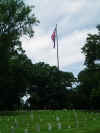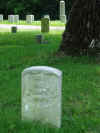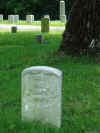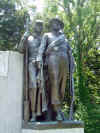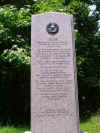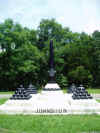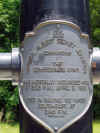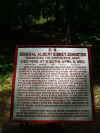Shiloh National Military Park was established in 1894 to preserve the scene of the first major battle in the Western theater of the Civil War. The two-day battle, April 6 and 7, 1862, involved about 65,000 Union and 44,000 Confederate troops. This battle resulted in nearly 24,000 killed, wounded, and missing. It proved to be a decisive victory for the federal forces when they advanced on and seized control of the Confederate railway system at Corinth, Mississippi. The battlefield contains about 4,000 acres at Shiloh and an interpretive center at Corinth, Mississippi. The park has within its boundaries the Shiloh National Cemetery along with the well preserved prehistoric Indian mounds that are listed as a historic landmark.
 The gates to the National Cemetery
The gates to the National Cemetery 
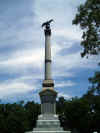 Iowa Monument, on the left side an angel records the event
Iowa Monument, on the left side an angel records the event
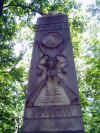 31st US Infantry Memorial
31st US Infantry Memorial  Grant's final line of
Grant's final line of
defense on the first day
 Pittsburg Landing where the Army of the Ohio came to Grant's rescue.
Pittsburg Landing where the Army of the Ohio came to Grant's rescue.
 General Wallace was killed at Shiloh
General Wallace was killed at Shiloh
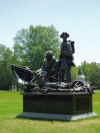 The Tennessee Memorial, no doubt the best looking one.
The Tennessee Memorial, no doubt the best looking one.
 The Sunken Road leading to the Hornet's Nest
The Sunken Road leading to the Hornet's Nest
 Shiloh Church (Shiloh means "Peaceful Place") Shiloh was an
ancient village of central Palestine northwest of the Dead Sea. In the Bible,
it was a meeting place and sanctuary for the Israelites and the site of a
tabernacle where the Ark of the Covenant was kept until its capture by the
Philistines. Generally understood as denoting the Messiah, "the peaceful
one," as the word signifies (Gen. 49:10).
Shiloh Church (Shiloh means "Peaceful Place") Shiloh was an
ancient village of central Palestine northwest of the Dead Sea. In the Bible,
it was a meeting place and sanctuary for the Israelites and the site of a
tabernacle where the Ark of the Covenant was kept until its capture by the
Philistines. Generally understood as denoting the Messiah, "the peaceful
one," as the word signifies (Gen. 49:10).
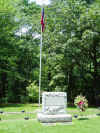 Confederate burial trench. Most were buried in mass graves.
Confederate burial trench. Most were buried in mass graves.
Texas General Albert Sidney Johnston, Commanding General of the Army of Mississippi was killed on the first day.
Finally, the Bloody Pond. I have a thing for ponds. While in Poland studying the Holocaust I almost threw a stone into a pond at Birkenau. Then I learned the ashes of thousands of Jews were in there. Since then, I have a thing for ponds.
This shallow pool of water was in the path of the retreating Federal Army as it was pushed back toward the river on Sunday. Being the only water in the immediate vicinity, the wounded from both sides crawled here to quench their thirst and bathe their wounds. So many bled in and around the pond that the water became stained the color of blood.
If you stand soft and silent
In the night’s early chill,
You can still hear the cannon
Roar across “Shiloh Hill.”
-Mark Putnam

